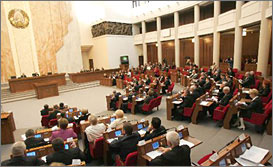Law ‘On Amnesty’ adopted in the first reading
The deputies of the Chamber of Representatives unanimously adopted at the sitting on 6 May the law On amnesty in connection with the 65th anniversary of the Victory in the World War II of 1941-1945.
According to Anatol Kuliashou, the Interior Minister, the law was worked out to realize the principle of humanism concerning the persons who mended their ways after committing crimes that didn’t present a great social danger.
As a result of the amnesty, about 2,230 people can be released from closed penitentiary institutions, and about 900 more – from open ones.
The prison terms are reduced by a year to 9,300 prisoners of closed penitentiary institutions and 1,100 prisoners of open penitentiary institutions.
The law also provides granting parole to under-aged, pregnant women and single fathers who have underage children, pensioners, invalids who are ill with active form of tuberculosis, HIV-positive individuals, war veterans, participants of the liquidation of consequences of the Chernobyl accident, the persons who received injuries during military services, if they committed crimes that don’t belong to the category of grave crimes.
Some other categories of people can also be released from arrest, personal restraint or assignment to disciplinary military service, in the case they committed crimes that don’t present a great social danger (up to 2 years of imprisonment, or any term of arrest), and for less grave crimes (up to 6 years of imprisonment) after serving at least ¼ of the prison term.
Thereby, the convicts who committed other categories of crimes and cannot be granted parole, are pardoned for such crimes partially, by reduction of the terms for 1 year.
The amnesty doesn’t spread on the persons who had been granted parole or clemency and committed deliberate crimes afterwards, those who didn’t compensate the material loss inflicted by their crimes (except for the privileged categories of individuals), those who malignantly violate the regime of the penalty, those who are confessed especially dangerous repeated offenders; those who received life sentence; those to whom death or life sentenced were replaced with other penalties; those who committed a murder, rape or extortion with aggravating circumstances, gangsterism, terrorism or crimes against the state; those who created or participated in a criminal organization or committed corruption crimes because of material interests; those who were drawn to criminal responsibility for driving in inebriated state.
As said by Mr. Kuliashou, repeated crimes are committed by some 7-10% of those who are released on parole. The previous amnesty was dated to the 65th anniversary of the freeing of Belarus from the Nazi invaders and was held in 2009.


















